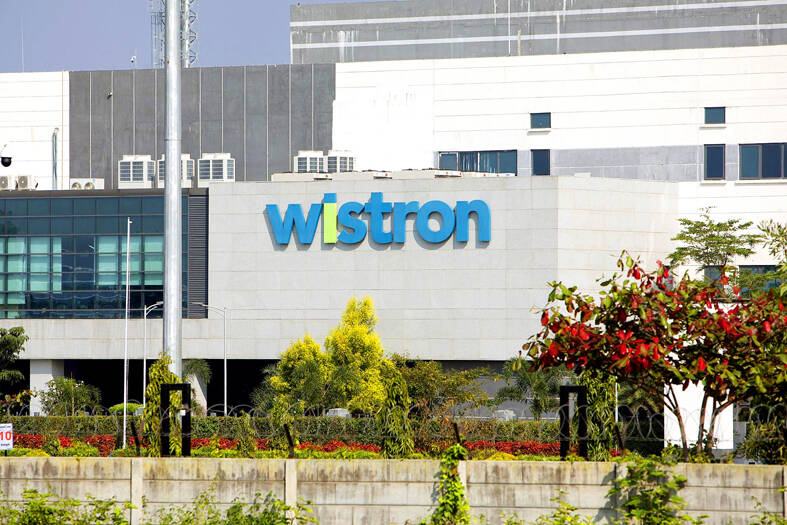Wistron Corp (緯創), which supplies graphics processing unit (GPU) server modules to Nvidia Corp, yesterday said it expects sales this year from non-PC products to rise to 25 percent of total revenue, up from last year’s 20 percent, driven by growing demand for artificial intelligence (AI) products.
Revenue from GPU-based AI servers, GPU accelerator cards, AI modules and AI systems is expected to triple this year, compared with annual growth of 50 percent last year, the company said.
PACKAGING SHORTAGE

Photo: Samyukta Lakshmim, Bloomberg
Wistron blamed a shortage of chip-on-wafer-on-substrate (CoWoS) packaging capacity for its “conservative” growth last year.
“We expect to see a triple-digit percentage growth in revenue generated by AI products this year,” Wistron chief executive officer Jeff Lin (林建勳) told an online investors’ conference.
“The second half would be better than the first half in terms of AI business,” he said.
Wistron has secured orders from multiple enterprise customers in the AI business, Lin said.
The company has also expanded its AI product portfolio to include GPU accelerator cards, he said.
CAPEX PLAN
This year, Wistron plans to spend about NT$14 billion (US$445 million) on capacity expansion in Taiwan, Vietnam and Mexico, with half of the funds being allocated to Taiwan, it said.
In the US, Wistron is to set up a new production line to serve customers there, it said.
On the PC front, Wistron expects its notebook computer revenue to grow by up to 5 percent annually this year, after emerging from a slump last year, Lin said.
Overall, the company’s revenue is not expected to show significant growth this year, capped by a tepid world economy and geopolitical tensions, Wistron chairman Simon Lin (林憲銘) said.
The company’s target is to raise its profitability by optimizing product lineups, he said.
IPHONE EXIT
Wistron expects to wrap up the disposal of its US$125 million of Indian assets this quarter, as the company is shifting away from iPhone assembly to AI servers.
The company in October last year agreed to sell its iPhone assembly business in India to Tata Electronics Pvt Ltd, a fully owned subsidiary of Tata Group.
Wistron reported the strongest profit in about 12 years last year, as its transformation efforts started to bear fruit.
Net profit rose 2.8 percent to NT$11.47 billion, compared with NT$11.16 billion in 2022. Earnings per share climbed to NT$4.08 from NT$4.01.
Gross margin edged up to 7.96 percent last year from 7.08 percent in the prior year, hitting an all-time high.
The company’s board of directors approved a proposal to distribute a cash dividend of NT$2.6 per share, the same as last year. That represented a payout ratio of 64 percent.

On Ireland’s blustery western seaboard, researchers are gleefully flying giant kites — not for fun, but in the hope of generating renewable electricity and sparking a “revolution” in wind energy. “We use a kite to capture the wind and a generator at the bottom of it that captures the power,” said Padraic Doherty of Kitepower, the Dutch firm behind the venture. At its test site in operation since September 2023 near the small town of Bangor Erris, the team transports the vast 60-square-meter kite from a hangar across the lunar-like bogland to a generator. The kite is then attached by a

Foxconn Technology Co (鴻準精密), a metal casing supplier owned by Hon Hai Precision Industry Co (鴻海精密), yesterday announced plans to invest US$1 billion in the US over the next decade as part of its business transformation strategy. The Apple Inc supplier said in a statement that its board approved the investment on Thursday, as part of a transformation strategy focused on precision mold development, smart manufacturing, robotics and advanced automation. The strategy would have a strong emphasis on artificial intelligence (AI), the company added. The company said it aims to build a flexible, intelligent production ecosystem to boost competitiveness and sustainability. Foxconn

Leading Taiwanese bicycle brands Giant Manufacturing Co (巨大機械) and Merida Industry Co (美利達工業) on Sunday said that they have adopted measures to mitigate the impact of the tariff policies of US President Donald Trump’s administration. The US announced at the beginning of this month that it would impose a 20 percent tariff on imported goods made in Taiwan, effective on Thursday last week. The tariff would be added to other pre-existing most-favored-nation duties and industry-specific trade remedy levy, which would bring the overall tariff on Taiwan-made bicycles to between 25.5 percent and 31 percent. However, Giant did not seem too perturbed by the

TARIFF CONCERNS: Semiconductor suppliers are tempering expectations for the traditionally strong third quarter, citing US tariff uncertainty and a stronger NT dollar Several Taiwanese semiconductor suppliers are taking a cautious view of the third quarter — typically a peak season for the industry — citing uncertainty over US tariffs and the stronger New Taiwan dollar. Smartphone chip designer MediaTek Inc (聯發科技) said that customers accelerated orders in the first half of the year to avoid potential tariffs threatened by US President Donald Trump’s administration. As a result, it anticipates weaker-than-usual peak-season demand in the third quarter. The US tariff plan, announced on April 2, initially proposed a 32 percent duty on Taiwanese goods. Its implementation was postponed by 90 days to July 9, then